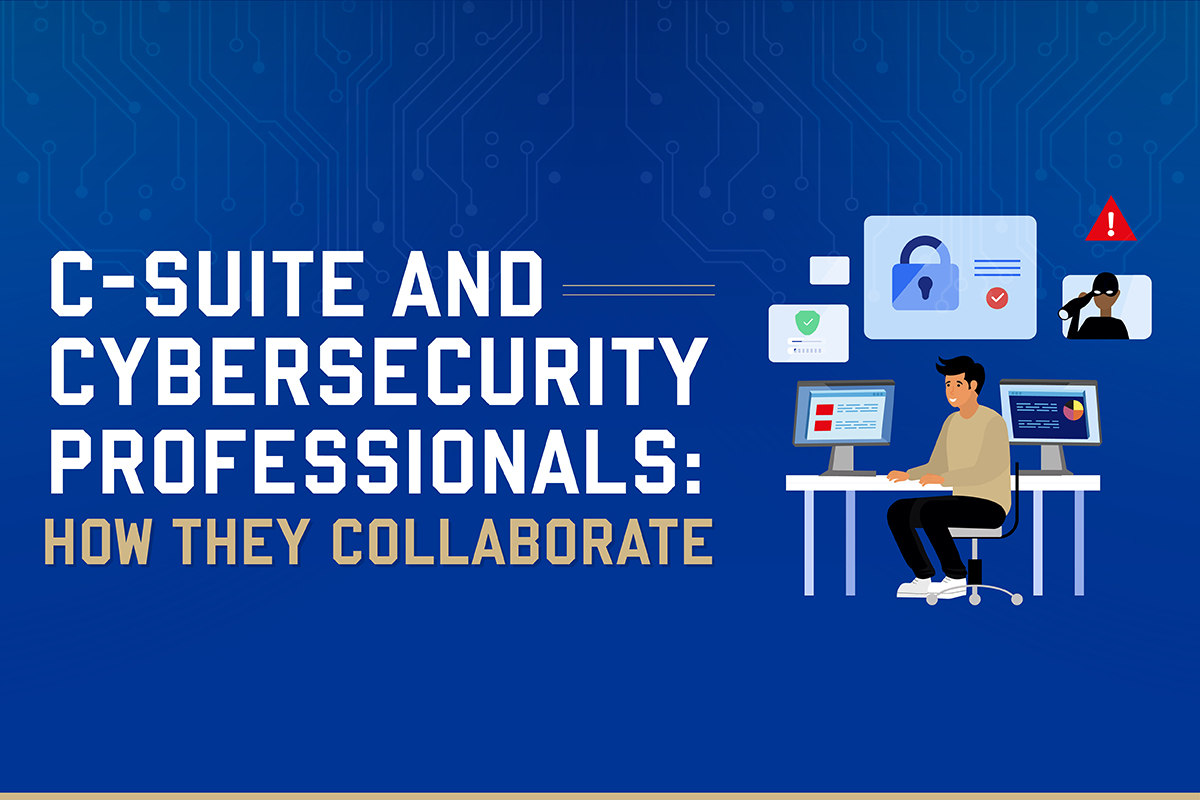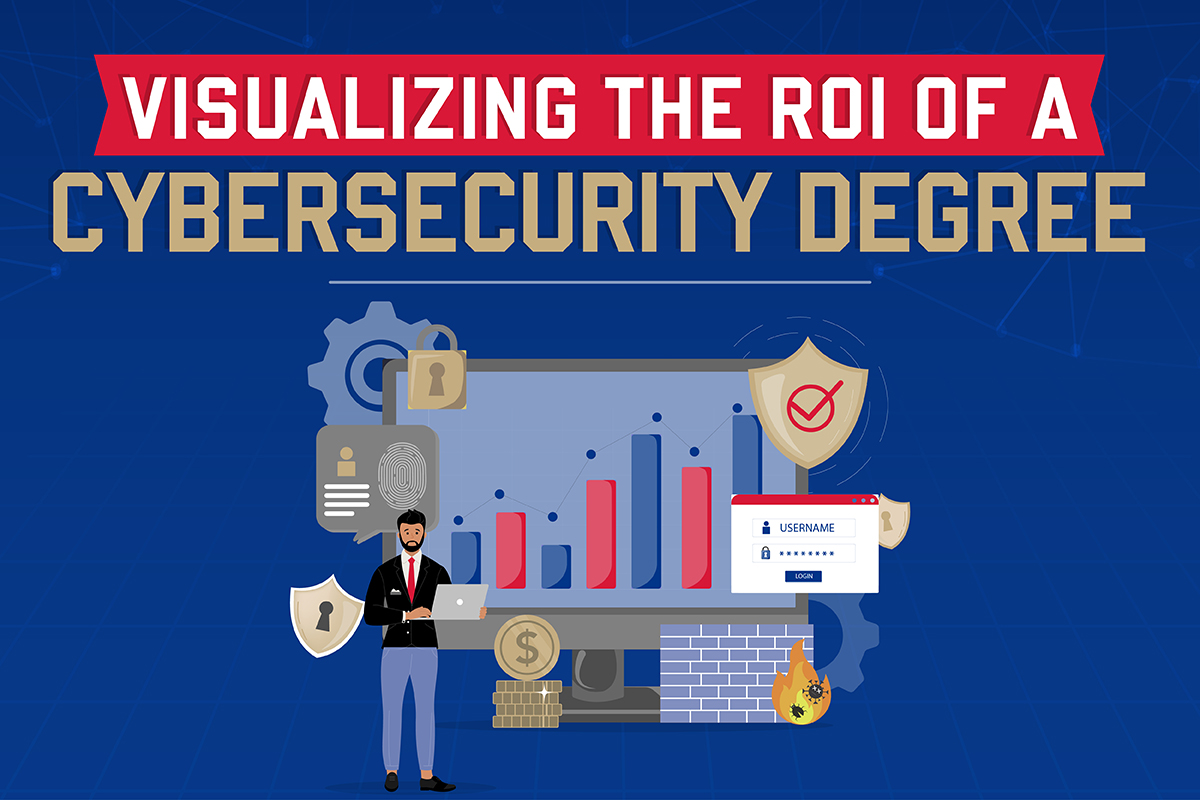Cyber Intelligence: Definition and Career Opportunities
Written by:
University of Tulsa
• Jul 22, 2024

As cyber threats continue to evolve and hackers become ever more skilled at exploiting system vulnerabilities, developing defenses that can keep up is a top priority. However, many organizations face a shortage of skilled workforce members. A 2022 report from ISC2 noted a shortage of 436,080 cybersecurity workers in North America, a nearly 9% increase over the previous year. The same report reported that about 75% of cybersecurity professionals felt that a significant staff shortage was a moderate or extreme risk to their organization’s risk of a cyber attack.
Cyber intelligence is a critical aspect of cybersecurity that focuses on identifying emerging threats. Those who are interested in accelerating their cybersecurity careers should consider an advanced degree to develop their cyber intelligence skills and take advantage of the high demand in the field to pursue their career goals.
What’s Cyber Intelligence?
Cyber intelligence involves studying cybercrime data to identify emerging forms of attacks. It focuses on understanding new ways that hackers are taking advantage of a system’s vulnerabilities, rather than responding to ongoing attacks. For example, a specialist in cyber intelligence would track an emerging cyber attack (such as a specific type of malware), analyze the tactics used, and make changes to the organization’s defenses to anticipate that kind of attack.
What’s the Benefit of Cyber Intelligence?
Cyber intelligence helps organizations spend fewer resources recovering from attacks by mitigating or preventing attacks altogether. Cybercrime is costly, with the FBI reporting a loss of $12.5 billion to cyber attacks in 2023. While developing systems that react quickly to attacks can be critical in reducing these costs, proactive measures informed by cyber intelligence are another tool in battling cyber threats.
What Are Some Cyber Intelligence Career Options?
Cyber intelligence is only one aspect of many cybersecurity careers — but a critical component in nearly all of them. Many cybersecurity careers require extensive knowledge of various systems, and those looking to advance their careers may consider continued education, such as an online master’s degree in cybersecurity, to help them prepare for these roles and stand out among their peers. Below are some career examples.
Cyber Threat Analyst
Cyber threat analysts use cyber intelligence to understand a system’s vulnerabilities, conducting rigorous testing and developing defenses against potential cyber attacks. They’re also the first line of defense against cyber attacks that do break through, making them critical for both proactive and reactive protection of organizations. The median annual salary for cybersecurity analysts, including cyber threat analysts, was approximately $81,300 as of June 2024, according to Payscale.
Penetration Tester
Penetration testers, sometimes called ethical hackers, use their understanding of cyber intelligence to perform mock cyber attacks on an organization’s system. After identifying emerging cyber threats and how they might exploit a system’s vulnerabilities, penetration testers point out weaknesses and recommend improvements. The median annual salary for penetration testers was approximately $95,060 as of June 2024, according to Payscale.
Chief Information Security Officer
Chief information security officers (CISOs) are executive-level managers of an organization’s cybersecurity systems and workforce. They use their knowledge of cyber intelligence to help design cybersecurity strategies; train employees to avoid becoming victims of emerging cyber threats; and manage cybersecurity operations, such as firewalls, while adhering to the company’s goals. The median annual salary for CISOs was approximately $177,000 as of June 2024, according to Payscale.
What Are Some Key Cyber Intelligence Skills?
Careers that heavily use cyber intelligence focus on a proactive understanding of cyber threats, developing and implementing protections for identified threats, communicating those protections to others in the organization, and keeping stakeholders informed. Many of these skills are advanced as part of a cybersecurity curriculum through hands-on activities and virtual labs. Skills for various cyber intelligence careers include the following:
-
Computer and Networking Knowledge: To best understand how hackers use vulnerabilities and how systems can be taken advantage of, cyber intelligence requires a deep understanding of networking and various operating systems.
-
Cybersecurity Knowledge: Hackers develop programs and code to exploit different weaknesses in a system’s defenses, and understanding how these defenses work allows professionals to pinpoint where they don’t. Concepts such as encryption and authentication are a key part of cybersecurity, and being well versed in their application is critical in testing systems and preventing attacks.
-
Communication: Cybersecurity professionals must convey the potential impact of different threats to stakeholders who are allocating resources for defenses and new technology. Particularly at the executive level, communication is vital to explaining high-level strategies to other members of the C-suite and the cybersecurity workforce.
-
Ethics: Cybersecurity professionals frequently work with sensitive information, including confidential employee and company data. Respecting this data and the people it’s connected to is key to remaining professional, and reckless handling can have disastrous consequences, such as potential data leaks or company scandals.
Cyber Intelligence Careers Job Outlook
Cyber-enabled jobs, that is, jobs that require digital skills, continue to be in high demand, likely due to the increasing cost and frequency of cyber attacks. According to the U.S. Bureau of Labor Statistics (BLS), information security analyst positions, which include cyber threat analysts and penetration testers, are projected to grow by 32% between 2022 and 2032. This is significantly higher than the average 3% growth for all careers.
Those in cybersecurity management positions can expect high growth compared with the average career trajectory. The BLS notes that positions for computer and information systems managers, including CISOs, are projected to grow by 15% during the same time period. As organizations take on more analysts, they need professionals with experience and management skills to help keep employees organized and on target.
Enhance Your Cybersecurity Career With The University of Tulsa
As new forms of cyber threats continue to develop, continued education can help professionals keep up with evolving technology and monitor changes in cybersecurity infrastructure and the cyber intelligence necessary to stop attacks. The University of Tulsa’s online Master of Science (M.S.) in Cyber Security program can advance your cybersecurity career through a comprehensive education with either technical or leadership tracks, allowing you to align your education with your career goals.
The program offers students a curriculum on the foundational concepts of cybersecurity and how technologies are used in modern organizations. With an accelerated schedule that can help you earn your degree in as little as 20 months, our online degree can help you achieve your goals while accommodating other commitments.
Discover what continued learning can help you achieve.
Recommended Readings
Cybersecurity Internships and Resources
Cybersecurity Coding and Programming Languages
Cybersecurity vs. Computer Science: Career Opportunities and More
Sources:
FBI, Internet Crime Report 2023
IBM, What Is Threat Intelligence?
Indeed, What Does a Chief Information Security Officer Do?
Indeed, What Does a Penetration (Pen) Tester Do? (With Salary)
Indeed, What Is a Threat Intelligence Analyst? A Definitive Guide
ISC2, Cybersecurity Workforce Study 2022
Payscale, Average Chief Information Security Officer Salary
Payscale, Average Cyber Security Analyst Salary
Payscale. Average Penetration Tester Salary
U.S. Bureau of Labor Statistics, Computer and Information Systems Managers
U.S. Bureau of Labor Statistics, Information Security Analyst


